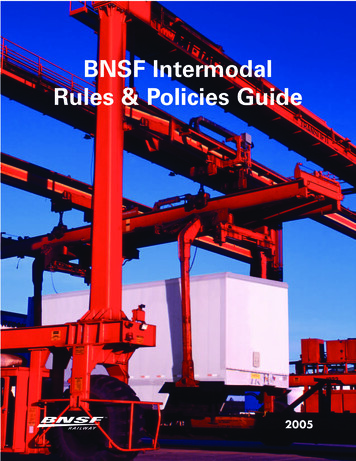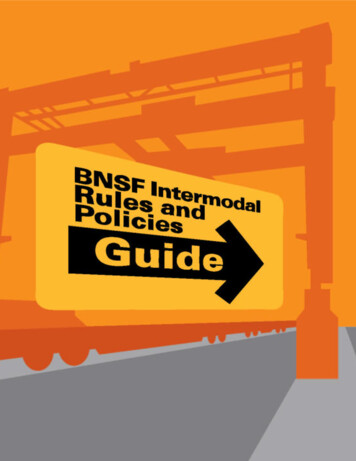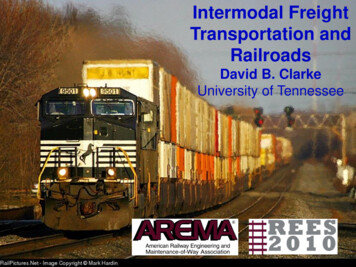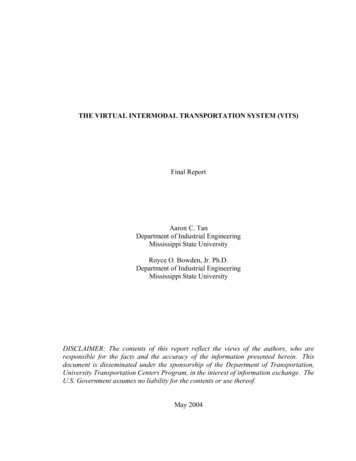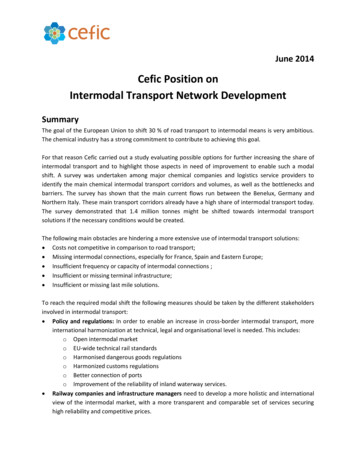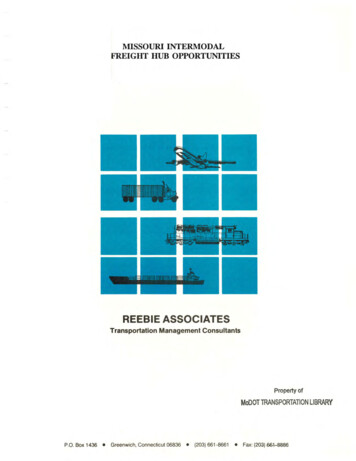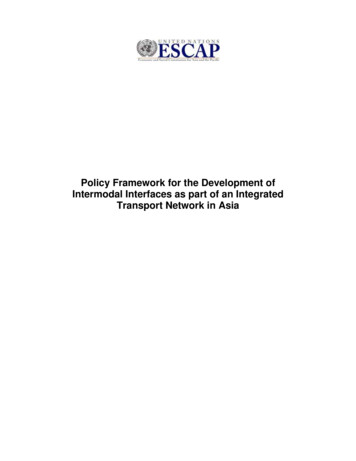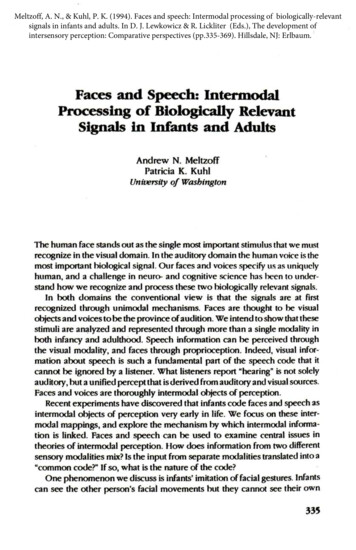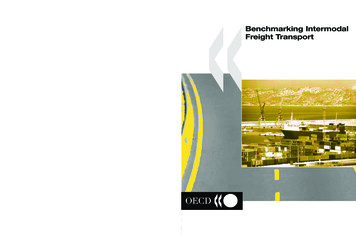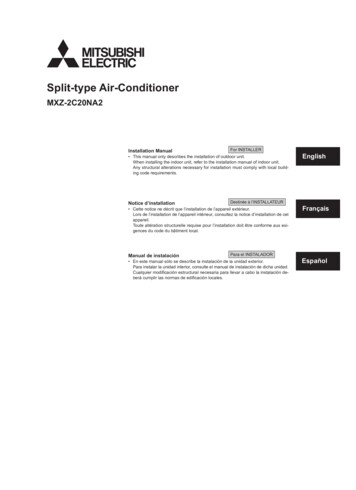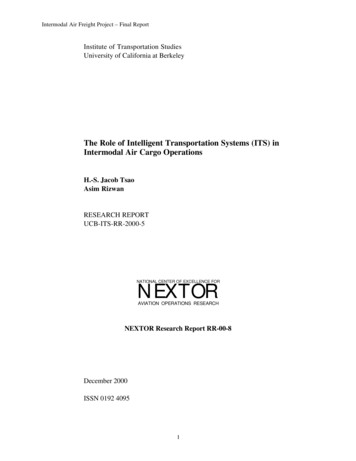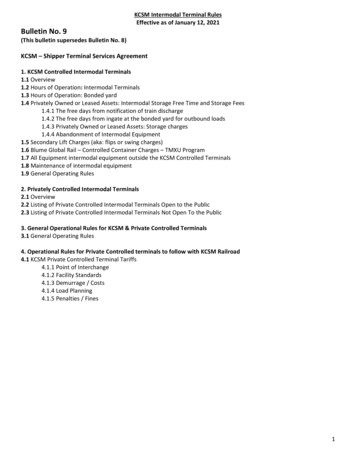
Transcription
Bulletin No. 9KCSM Intermodal Terminal RulesEffective as of January 12, 2021(This bulletin supersedes Bulletin No. 8)KCSM – Shipper Terminal Services Agreement1. KCSM Controlled Intermodal Terminals1.1 Overview1.2 Hours of Operation: Intermodal Terminals1.3 Hours of Operation: Bonded yard1.4 Privately Owned or Leased Assets: Intermodal Storage Free Time and Storage Fees1.4.1 The free days from notification of train discharge1.4.2 The free days from ingate at the bonded yard for outbound loads1.4.3 Privately Owned or Leased Assets: Storage charges1.4.4 Abandonment of Intermodal Equipment1.5 Secondary Lift Charges (aka: flips or swing charges)1.6 Blume Global Rail – Controlled Container Charges – TMXU Program1.7 All Equipment intermodal equipment outside the KCSM Controlled Terminals1.8 Maintenance of intermodal equipment1.9 General Operating Rules2. Privately Controlled Intermodal Terminals2.1 Overview2.2 Listing of Private Controlled Intermodal Terminals Open to the Public2.3 Listing of Private Controlled Intermodal Terminals Not Open To the Public3. General Operational Rules for KCSM & Private Controlled Terminals3.1 General Operating Rules4. Operational Rules for Private Controlled terminals to follow with KCSM Railroad4.1 KCSM Private Controlled Terminal Tariffs4.1.1 Point of Interchange4.1.2 Facility Standards4.1.3 Demurrage / Costs4.1.4 Load Planning4.1.5 Penalties / Fines1
KCSM Intermodal Terminal RulesEffective as of January 12, 2021KCSM – Shipper Intermodal Terminal Services AgreementThis official statement and the rules contained apply to all Intermodal traffic on Intermodal Equipment, originating fromand / or destined to KCSM Controlled and / or Private Controlled Terminals, interchanged to and subject to line haulservices provided by KCSM.In addition, Shippers will also be bound to the Rules Tariff Publications (current and future posted) listed on the KCSwebsite ch includes, but is not limited to, the most current versions of KCS 9011: rules for traffic on KCS’ US rail network, subject to percentage based fuel surcharge KCSM Freight Railroad Transportation Public Service Agreement: rules for traffic on KCSM’s Mexico rail network.In addition, Shippers will be bound to the Intermodal related accessorial charges listed on the KCS cesThis includes, but is not limited to the most current versions of the following tariffs: KCS 6000 – KCS’ US rail network tariff related to rail car demurrage and Intermodal Equipment storage KCS 9213 – KCS’ US rail network tariff governing diversions and reconsignments KCSM Freight Rules Catalog – KCS’ Mexico rail network As well as the registered SCT maximum charges eligible to be assessed at our KCSM owned intermodal facilitiesat Salinas Victoria, NL, Interpuerto, SLP and Puerta Mexico, EDOMEX.1. KCSM Controlled Intermodal Terminals1.1 Overview.As used in this agreement, the term “KCSM Controlled” means any intermodal terminal that is owned and operatedby KCSM (or one of KCSM’s subsidiaries), which includes Salinas Victoria, NL, Interpuerto, SLP and Puerta Mexico,EDOMEX. KCSM line haul rate offers include the following: standard rail car switching (i.e. not in connection withCustoms or diversions activity), primary lifts, gate-house services, chassis inventory for rail-controlled owned / leasecontainers (private asset ownership excluded), and other related intermodal services. KCSM is responsible for cargoliability and security while Intermodal Equipment are located inside KCSM Controlled terminals. Shippers will abidethe KCSM intermodal rules, policies, and yard tariffs for free time, daily storage fees, and secondary lift charges.1.2 Hours of Operation: Terminal GatehousesThe 3 terminals controlled by KCSM have operating hours from 24 hours a day, 7 days a week.Except for holiday closure on December 25th and January 1st1.3 Hours of Operation: Mexican CustomsNOTE: Mexican Customs does not operate on Sundays at any KCSM bonded yard locations.NOTE: Times are based on Mexico’s time standard (CST), which varies slightly from the US during the daylightsavings time (DST) transitions in both spring and fall Salinas Victoria: Monday to Friday from 9:00 to 18:00. Saturday from 10:00 to 12:00.Interpuerto: Monday to Friday from 9:00 to 19:00. Saturday from 10:00 to 13:00.Puerta Mexico: Monday to Friday from 9:00 to 17:00. Saturday from 09:00 to 14:00.These schedules are subject to change without prior notification by Mexican Customs. KCSM is not responsible for theschedules above.2
KCSM Intermodal Terminal RulesEffective as of January 12, 20211.4. Privately Owned or Leased Assets: Intermodal Storage Free Time and Storage Fees: At KCSM Controlled terminals,the storage free time for Intermodal equipment located within the terminal for both revenue empty and/or loadedIntermodal Equipment, which includes containers, trailers, chassis, or isotanks, and for both inside / outside bondedyard shipments are as follows:1.4.1 The storage free days from first notification event (“PNTF”) sent to the Shipper after the train discharge or deramp(“DRMP”) event.Note: Notify profile updates are a Shipper’s responsibility, please contact customer service by email for Mexico atcscautointer@kcsms.com.mx and for US at CSolutions@KCSouthern.com to verify that your notify profile information isup to date.If First Notify (PNTF) is on:Day of notification plus 5 calendar days(includes all weekends and holidays)Then Free Storage Time will end at 23:59 on these idayInbound rail traffic to KCSM intermodal terminalNOTE: The Notification is programmed to be sent at the moment of unloading (discharge, deramp) from the train.Notifications will be sent through EDI or email to the Shipper’s designated contacts according to their pre-establishedshipping profile. Failure to receive notifications should be escalated to KCSM Customer Service as soon as possible toremedy the profile. It is the Shipper’s responsibility to have a valid shipping profile and designated contacts on file.Repeat notification will be sent on a daily basis until unit is successfully outgated from the KCSM Terminal.1.4.2 The free days from ingate at the bonded yard for outbound loads:To facilitate timely Customs documentation processing, KCSM allows up to 14 days at the KCSM Origin terminal’sbonded yard for proper Customs clearance prior to loading the Intermodal Equipment to a rail car destined to a US orCanadian destination.While today there is no charge for this storage time, it is constantly monitored for proper Shipper behaviors on theKCSM Terminals with regards to bonded yard space and chassis use. In addition, after 15 days have elapsed the“pedimento” becomes expired and Shippers have a responsibility to reprocess Customs documentation and KCSM willnot add the Intermodal Equipment to the load plan until customs broker notifies Mexican Customs at Nuevo Laredooffice that the “pedimento” has become expired to obtain additional days of extension for the interchange and mustshow a copy from Customs Broker Agency stamped of submitted letter to Aduana de Nuevo Laredo. This will beaccompanied by KCSM accessorial charges to modify waybills and handle this additional administrative duty.For inbound Intermodal Equipment from Lazaro Cardenas with destination at KCSM Terminals bonded yards (T3), the“pedimento” becomes expired after 15 days from the clearance stamped. After this time has elapsed, KCSM has tonotify destination Customs (Aduana de Toluca, Aduana de Aguascalientes Sección Interpuerto San Luis Potosí and/orAduana de Monterrey) to obtain days of extension for final clearance.3
KCSM Intermodal Terminal RulesEffective as of January 12, 2021If Ingate (IGAT) is on:Day of ingate plus 14 calendar days(includes all weekends and holidays)Then Free Time will end at 2359 on these ndaySecond Monday after IngateSecond Tuesday after IngateSecond Wednesday after IngateSecond Thursday after IngateSecond Friday after IngateSecond Saturday after IngateSecond Sunday after IngateOutbound Bonded rail traffic at KCSM intermodal terminals1.4.3 Privately Owned or Leased Assets: Storage Charges: Once exceeding the last free day, a storage charge will beapplied at a rate of 30.00 USD plus 16% IVA (Mexico’s Value Added Tax) per storage day in excess of allotted free time.As of January 12, 2021 and the implementation of KCSM’s new storage program, Shipper setup with KCSM requiresdefinition of the storage payment practices for the Shipper at each of the KCSM facilities. The Shipper may elect toapply for credit (or extend current credit used with line haul charges) and ‘guarantee’ all storage at a given KCSMIntermodal Facility, meaning that the units will outgate without payment prior to outgate and electing to be invoicedand pay on credit terms. The alternative is that a Shipper may consider not to apply for credit or a Shipper may havecredit with KCSM, but elect not to put storage charges against their credit as “guaranteed”. In this case, the IntermodalEquipment would be considered “non-guaranteed” and the Shipper would pay for individual Intermodal Equipment atthe KCSM Intermodal facilities based on ultimate responsibility for storage. A non-guaranteed Shipper could be a KCSMline haul customer, or could be a drayman, customs broker, beneficial cargo owner or other party to the logisticschannel. KCSM requires non-guaranteed customers to make payment, or to guarantee payment prior to outgating theunit via our MyKCS Intermodal Storage platform. A unit can only be guaranteed if a customer has credit established withKCSM. If not, then payment is required. If a unit is marked as guaranteed, then that means the customer is agreeing tobe invoiced and pay for the charges due.Storage charges are assessed independently of any other accessorial charge, including but not limited to: secondary liftcharges (aka: flips or swing charges, section 1.5), chassis charges, or rail controlled equipment per-diem expense. KCSMor a subsidiary of KCSM that owns/operates a given intermodal terminal will provide an invoice to the Shipper for eachIntermodal Equipment where storage charges are incurred. This process is generated on an overnight batch process,resulting in an invoice provided 1 day after outgate.KCSM provides no guidance regarding the storage policies of Privately Controlled Intermodal terminals.4
KCSM Intermodal Terminal RulesEffective as of January 12, 20211.4.4 Abandonment of Intermodal Equipment: Should Intermodal Equipment exceed more than 60 calendar days fromdate of ingate or deramp for purposes of revenue service, the Intermodal Equipment is deemed to be ‘abandoned’. Thisis a state that is regardless of loaded or empty status. KCSM Intermodal Operations and Legal will make formalnotification to the line haul Payer of Freight (which may differ from the Shipper) on the prior movement waybill. Oncedeemed abandoned, KCSM will proceed according to Commercial Law: Articles 603 and 604. Any expenses incurred byKCSM to destroy product deemed abandoned will be charged back to the Shipper.Should Intermodal Equipment exceed more than 60 calendar days from date of last ingate for purposes of non-revenueservice (i.e. empty storage or a chassis pool), the Intermodal Equipment is deemed to be ‘abandoned’. The units in thisclassification are all considered either empty or bare. KCSM Intermodal Operations and Legal will make formalnotification to the Shipper on the prior movement waybill (empty storage) or the Equipment Owner of the given chassismark. Once deemed abandoned, KCSM will proceed according to Commercial Law: Articles 603 and 604.1.5 Secondary Lift Charges (aka: flips or swing charges): Primary lifts are included in the Shipper’s line haul rates whenoriginating or terminating linehaul service at a KCSM Controlled Intermodal Terminal.Primary lifts are defined as: the unloading from the rail car to a chassis or to the ground (destination primary lift) or the unloading from a chassis to the railcar or from the ground to the railcar (origin primary lift)Any lift in addition to this primary lift activity is considered as a secondary lift. This secondary lift will be chargeable tothe Shipper for the following actions: The lift from the ground to a chassis The lift from a chassis to the ground or The lift from one chassis to another chassis, in the case where the Shipper is deficit of chassis inventory or isexperiencing a mechanical issue (‘bad order’) with the chassis. This scenario is often called a flip or a swing.Secondary lift charges will be applied at 30 USD plus 16% IVA (Mexico’s Value Added Tax) per secondary lift.1.6 Blume Global Rail – Controlled Container Charges – TMXU ProgramKCSM has authorized Blume Global (formerly known as Rez-1) to administer, invoice and collect from Shippers forcharges related to the TMXU program, which is jointly owned and operated by KCSM and Norfolk Southern.There are many charges associated with use of a TMXU container, including but not limited to: Per Diem charges for container usage Storage Cross-Overs Various reservation chargesDetails of these policies can be found on Blume Global’s ion/policies/shipper/index.htm, with appropriate administrativecredentials, under the “Help and Policies” section and selecting “TMX”.TMXU units will be available for Shipper use for intermodal shipments originating from KCSM Controlled IntermodalTerminals. TMXU product is offered only at Salinas Victoria, NL, Interpuerto, SLP and Puerta Mexico, EDOMEX.KCSM will not provide equipment per diem free time (includes weekends and holidays) for TMXU. Shippers are chargedper diem from the time of reservation until that unit is returned loaded to KCSM for origin line haul shipment crossborder. Sections 1.4.1, 1.4.2, and 1.4.3 also apply to the TMXU product.5
KCSM Intermodal Terminal RulesEffective as of January 12, 2021Day of notification plus 5 calendar daysInbound rail traffic to KCSM intermodal terminal(includes all weekends and holidays)If First Notify (PNTF) is on:Then Free Storage Time will end at 2359 on these ndayDays 1 thru 5Days 6 thru 10Days 11 thru 20Days 21 KCSM Per Diem Rates, effective January 01, 2019 20 USD per Day 30 USD per Day 50 USD per Day 200 USD per DayFor billing inquiries, please contact Blume Global Response at response@blumeglobal.com.1.7 All Intermodal Equipment outside the KCSM Controlled Intermodal Terminals1.7.1 All equipment located outside the KCSM Controlled Intermodal Terminals is the sole responsibility of the Shipperthat outgated the equipment.1.7.2 The Shipper’s drayman is responsible to return the empty Intermodal Equipment clean, without any residue ordunnage.1.7.3 Any empty Intermodal Equipment with trash or residue will not be allowed in the KCSM Controlled IntermodalTerminal.1.7.4 A twist lock mechanism to secure the container to a chassis must be used. Chains will not be allowed to secure thecontainer to a chassis.1.7.5 All Intermodal Equipment must have all its hazardous placard labels removed prior to ingate if they are movingunder a non-hazardous waybill.1.7.6 The Shipper is responsible for paying the DV (Depreciated Value) and any other legal costs to KCSM for any KCSMrail controlled equipment that is stolen or is determined to be a total loss caused by an accident once the equipment hasbeen outgated.1.7.7 Any damages detected in the ingate inspection will be recorded on the J-1 format (EIR) and handling carrierdamages (AAR guidelines) will be invoiced to the Shipper’s assigned Intermodal drayage company.6
KCSM Intermodal Terminal RulesEffective as of January 12, 20211.7.8 Any failure of the Shipper’s drayage company to pay for such damage may result in their suspension of accessingany Intermodal terminal. In addition, the Shipper will be held responsible for all outstanding invoices incurred by theirIntermodal drayage company of choice.Note: Upon arrival to the Intermodal terminal ingate, the drayman will be responsible to notify the Intermodal terminalpersonnel of any damage that occurred outside the Intermodal terminal. The drayman will also be responsible duringthe ingate inspection process to open the empty Intermodal Equipment doors so that the unit’s interior can beinspected. The Intermodal terminal personnel will inspect the equipment outside and the inside (empty IntermodalEquipment) physical condition and will record any damages on the J-1 format (EIR), both owner and handling carrierdamages (AAR guidelines). Once the inspection process is completed, the Intermodal terminal personnel will provide thedrayman a printed copy of the J-1.1.8 Maintenance of Intermodal Equipment KCSM Controlled Terminals: The cost of repairs for the Shipper’s privatefleet of Intermodal Equipment (non-railroad controlled equipment) shall be allocated at the KCSM Controlled terminalsas follows:1.8.1 Shipper shall perform at their expense both AAR’s owner and handling carrier responsible repairs: All Shipper’s owned / leased chassis either bare or mounted under a container. All Shipper’s owned / leased Intermodal Equipment received empty by rail car from a foreign railroad, by rail carfrom a Private Controlled terminal, or by the KCSM Controlled terminals’ ingate lanes.1.8.2 KCSM shall pay handling carrier damages as governed by the AAR’s rules for the Shipper’s loaded IntermodalEquipment if not recorded by a J-1 and or J-2 inspection form. Shipper will be required to receive a purchase orderapproval from KCSM prior to any repairs to the loaded Intermodal Equipment. The Shipper’s repair invoice will requirethe approved KCSM Purchase Order number with the approved repair cost for payment from KCSM. The EquipmentOwner has ten (10) calendar days from the time the equipment enters the KCSM Controlled intermodal terminal (off therail car or through the gatehouse) to receive a purchase order number for any and all KCSM handling carrier damageresponsibilities. After the 10th calendar day, KCSM will not be responsible for handling carrier damages. KCSM will havethe date of the receipt of the purchased order request plus three (3) calendar days to respond concerning theirresponsibility of the equipment damages.1.8.3 As between the Shipper and KCSM, KCSM shall not be responsible for any repairs that become necessary while aShipper’s Intermodal Equipment is in the possession of a third party, including a motor carrier, Private Controlledterminals, or foreign railroads.1.8.4 Damages to trailers not equipped with full-length lift pads will not be the responsibility of KCSM.1.8.5 KCSM shall be liable for costs and / or damages for equipment (AAR DV standards) and lading (KCSM currentliability limits) resulting from KCSM train accidents, (derailments, collisions, side- swipes, etc) while shipments are in thepossession of KCSM. KCSM will also be responsible for reported KCSM Controlled intermodal terminals accidents thatare attributed to their intermodal lift operator.1.8.6 Depreciated Value Calculation (DV) concerning trailers and aluminum containers are assumed to have a useful lifeof fifteen (15) years and a residual value equal to 10% of the original purchase price. Chassis and steel containers areassumed to have a useful life of twenty (20) years and also a residual value equal to 10% of the original purchase price.1.8.7 KCSM shall not be liable for any loss, damage, or delay to the lading and / or Intermodal Equipment, caused by Actof God, force majeure, the public enemy, and the authority of law, act of default of the Shipper or Owner, or naturalshrinkage, riots, or strikes.7
KCSM Intermodal Terminal RulesEffective as of January 12, 20211.8.8 Draymen are responsible to unlock twist locks when parking Intermodal Equipment at a KCSM ControlledIntermodal Terminal.1.9 General Operating Rules1.9.1 KCSM will require KCSM indemnity agreements to be signed by the Shipper and their service vendors to enter aKCSM Controlled Intermodal Terminal.1.9.2 Waybill cancellation requests will not proceed for any reason once the Intermodal Equipment has been scheduledto the load plan or it is loaded on the flat car.1.9.3 Payment of storage charges must be defined and agreed to as covered in section 1.4.3 prior to shipping withKCSM. For a non-guaranteed Shipper, the unit must either be “guaranteed” or payment for storage must be made priorto outgate. If storage charges are pending to be paid by a non-guaranteed Shipper, the Intermodal Equipment will notbe allowed to outgate.2. Private Controlled Intermodal Terminals2.1 Overview. As used in this agreement the term “Private Controlled” means any intermodal terminal facility that is notowned and operated by KCSM. Private Controlled terminals may or may not be open to the public.In addition, Shippers will be bound to the Intermodal related accessorial charges listed on the KCS cesThis includes, but is not limited to the most current versions of the following tariffs: KCS 6000 – KCS’ US rail network tariff related to rail car demurrage and intermodal unit storage KCS 9213 – KCS’ US rail network tariff governing diversions and reconsignments KCSM Freight Rules Catalog – KCS’ Mexico rail networkAs well as the registered SCT maximum charges eligible to be assessed at our KCSM owned intermodal facilities atSalinas Victoria, NL, Interpuerto, SLP and Puerta Mexico, EDOMEX.2.2 Private Controlled Intermodal Terminals Open To The Public. “Private Controlled” means any intermodal terminalnot owned or operated by KCSM. Any intermodal terminal not listed section 1.1 is considered a Private Controlledterminal. KCSM line haul rates include only train service to the Shipper’s designated spot inside the Shipper’s choice ofPrivate Controlled terminals. Shippers will abide by the Private Controlled terminal intermodal rules, policies, and yardtariffs for free time, daily storage fees, and primary / secondary lift charges. Private Controlled terminals will beresponsible for cargo liability and security while Intermodal Equipment is parked within the Private Controlled terminals.Shipper will also be responsible to follow the KCSM Private Controlled intermodal terminals tariffs. Private Controlledterminals opened to the public include (but are not limited to): Cuautitlan APMPantaco – KCSM’s line haul rate includes the primary liftQuerétaro SIDLitionFerroserviciosLogistikTerminal AmigoHidalgo TILHAll Mexican Port Terminals8
KCSM Intermodal Terminal RulesEffective as of January 12, 20212.3 Private Controlled Intermodal Terminals Not Open To The Public. “Private Controlled” means any intermodalterminal not owned or operated by KCSM. Any intermodal terminal not listed in section 1.1 is considered a PrivateControlled terminal. KCSM line haul rates include only train service to the Shipper’s designated spot inside the Shipper’schoice of Private Controlled terminals. Shippers will abide to the Private Controlled terminal intermodal rules, policies,and yard tariffs for free time, daily storage fees, and primary / secondary lift charges. Private Controlled terminals will beresponsible for cargo liability and security while Intermodal Equipment is parked within the Private Controlled terminals.Shipper will also be responsible to follow the KCSM Private Controlled terminals intermodal tariffs. Private Controlledterminals not open to the public include: Pesquería – KIA plantEncantada – FCA plantRojas – General Motors plantSilao – General Motors PlantEspanita – BMW Plant3. General Operational Rules for KCSM & Private Terminals3.1 General Operating Rules3.1.1 KCSM enforces the “No Bill – No Movement” policy at all ingate lanes. Shippers are responsible to provide KCSM allrequired billing information prior to the Shipper’s drayage company entering the KCSM Controlled terminal or privateterminals. All units without waybills will be rejected at the gate at KCSM terminals and will not be moved by KCSMfrom/to Private terminals.Exceptions:- Bare chassis for plate renewal will be only allowed to be ingated prior the signature of a written legal agreement.- Ingate of TMXU empty equipment need not be accompanied with a waybill3.1.2 KCSM and Private Terminals will load containers exclusively on flatbeds / chassis, which have been modified withbulkheads or twist locks that provide a positive locking mechanism. Other different mechanisms to secure containerswill not be allowed.3.1.3 KCSM and private terminals will only schedule Intermodal Equipment to load plan when:Requirements to schedule Intermodal Equipment to load planDestination Waybill Required Mexican Customs PedimentoUS EntryDomesticN/A N/AUS CanadaN/A QP BondN/AN/A 3.1.4 Shipper will ensure that the lading does not exceed the weight capacity of the Equipment Owner’s IntermodalEquipment guidelines. KCSM will not accept Intermodal Equipment with the combined gross weight exceeding 65,000pounds for 53 foot and 40 foot containers and 52,900 pounds for 20 foot containers. Gross weight means combinedweight of the Intermodal Equipment and its lading.3.1.5 Twenty (20’) foot containers, including ISO Tanks, must be tendered by the Shipper in pairs. Containers nottendered in pairs will be held for a matching twenty (20’) foot container from each Shipper in order to fill a railcar. KCSMwill not be responsible to cover additional costs (storage, Customs clearance, etc.) nor to transport empty containersfree of charge due to lack of 20’ pair.9
KCSM Intermodal Terminal RulesEffective as of January 12, 20213.1.6 KCSM will not accept coiled metal or scrap metal intermodal shipments via steel-wheeled interchange withanother railroad or from on-dock locations, regardless if stated in a price authority.3.1.7 The Shipper is responsible for any charges, cost, expenses, duties, taxes, and fees that are associated with ashipment’s clearance at the border and Customs (or any government agency) inspections. In addition, the Shipper isresponsible for any charges resulting from the shipment being delayed, detained, moved, lifted, drayed, and stored atthe border, an examination facility, or a KCSM facility.3.1.8 For any reason due to the Shipper’s action for a rail car destined to the U.S. or Mexico has to be removed from thetrain at the border rail bridge and / or on the KCSM rail network Intermodal Equipment load shifts, improperdocumentation / waybill, illegal commodities / contraband, Customs intensive inspection, etc.) the Shipper will beassessed all fines in addition to a USD 500.00 plus IVA tax (16%) per container penalty switch fee plus USD 100.00 plusIVA tax (16%) per day per diem penalty fee until the rail car has been released for the next available train movement.3.1.9 If for any reason the Shipper requests Intermodal Equipment to be unloaded from the train prior to reaching itsfinal destination, all fines will be assessed in addition to a USD 500.00 plus IVA tax (16%) per rail car switch. KCSM willnot guarantee removing Intermodal Equipment from active train movements. A fee of USD 75.00 plus IVA tax (16%)will be applied for the waybill correction for each container unloaded from the train short of its original destination.KCSM does not guarantee this request will be accepted.3.9.10 Waybill cancellation request will not proceed for any reason once the Intermodal Equipment has been scheduledto the load plan or it is loaded on the flat car.10
KCSM Intermodal Terminal RulesEffective as of January 12, 20214. Operational Rules for Private Controlled terminals to follow with KCSM Railroad4.1 KCSM Private Controlled Terminal Tariffs. All Shippers of record will be accountable to abide by the KCSM PrivateControlled intermodal terminal tariff guidelines:4.1.1 Point of Interchange KCSM will provide line haul services to its designated point of spot for rail cars inside the Shipper’s choice ofPrivate Controlled terminal. KCSM will provide the Shipper with a designated point of pick-up for rail cars loaded and / or bare at theShipper’s choice of Private Controlled terminal. Shipper will be accountable to provide KCSM rail cars that have undergone a proper railroad initial terminalinspection. Inspection includes: initial air brake test, Intermodal Equipment securement on the rail car, and amechanical rail car inspection.4.1.2 Facility Standards The Shipper’s choice of Private Controlled terminal must meet KCSM track standards and be approved by KCSMpersonnel at any given time. The Shipper’s choice of Private Controlled terminal must be free and clear of any hazardous conditions for KCSMpersonnel to enter and work within. KCSM will have the right to enter the Shipper’s choice of Private Controlled terminals at all time to validate thesafe conditions of the Private Controlled terminal.4.1.3 Demurrage / Costs Intermodal rail cars spotted to a Shipper’s choice of Private Controlled terminal will be handled under publictariff provisions for Demurrage. This publication is available on the Internet. The KCS Home Page address ishttp://www.kcsouthern.com. From the Home Page choose the ‘Customer Resources” link, then click the ‘Accessorial Services’ link and click ‘KCSM Accessorial Service Catalog’ link. Each chargeable debit (debits greater than credits) will be invoiced at USD 75.00 plus IVA tax (16%) per debit. Private Terminals will be responsible for using the KCSM on-line Demurrage system. The Shipper will not be responsible for Demurrage on Intermodal rail ca
Should Intermodal Equipment exceed more than 60 calendar days from date of last ingate for purposes of non-revenue service (i.e. empty storage or a chassis pool), the Intermodal Equipment is deemed to be 'abandoned'. The units in this classification are all considered either empty or bare. KCSM Intermodal Operations and Legal will make formal
